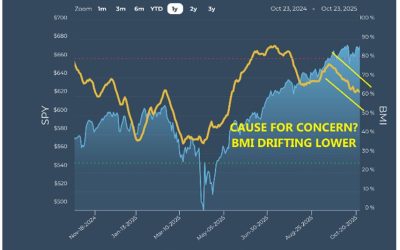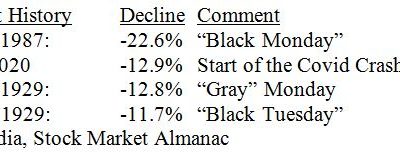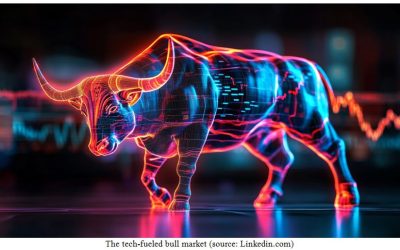by Louis Navellier
October 28, 2025
Last Wednesday, Bloomberg reported that this is the best start to earnings season in four-years. Yes, there have been a few disappointing reports, but data center stocks set the tone for this early surge.
Thanks to the data center boom, GE Vernova (GEV) announced that its third-quarter revenue rose by 12% to $9.97-billion (vs. the same quarter a year ago). During the past four quarters, the company’s earnings soared to $453-million, or $1.63 per share, vs. a loss of $99-million (35-cents) a year ago. GEV’s operating earnings were $2.17 per-share. The analyst community expected revenue of $9.15-billion and operating earnings of $1.72 per-share, so GEV delivered a 9% revenue surprise and a 26% earnings surprise! GEV’s orders soared 55% in the third quarter to $14.6-billion due to strong demand for natural gas turbines for electricity generation. CEO Scott Strazik said, “This era of increased electricity investment has just started, and we have substantial opportunity ahead of us as we provide the solutions required to help the world electrify, to thrive and decarbonize.”
Another stock riding the data center boom is Vertiv Holdings (VRT), which announced that its third-quarter sales rose 29.5% to $2.68-billion (vs. $2.07-billion in the same quarter a year ago). In the same period, the company’s operating earnings surged 63.2% to $1.24 per-share (vs. 76-cents last year). The analyst community was expecting sales of $2.58-billion and operating earnings of 98 cents per share, so Vertiv posted a 3.9% sales surprise and a 26.5% earnings surprise. The company also said its orders accelerated 60% in the past 12-months and 20% from the second-quarter.
Despite such great news and positive surprises from these two-companies, GE Vernova and Vertiv Holdings both declined on Wednesday, since a large “mean reversion” program kicked in, punishing stocks that were previous winners. Bespoke Investment Group reported that the top 10% of stocks in the Russell 3000 since August 1st declined by 5.73% on Wednesday, led by quantum computing companies, small modular nuclear reactor and solid-state battery stocks that have not yet posted their earnings. GEV, VRT and other data center stocks, plus AI-related stocks, were swept up in this one-day sell-off. However, since GEV, VRT and my other data center and AI-related stocks are posting spectacular third-quarter results and raising guidance, I expect them to rebound strongly.
Another data center related stock, Comfort Systems (FIX), announced on Thursday that its third-quarter revenue rose 35.4% to $2.45-billion (vs. $1.81-billion in the same quarter a year ago). During the same period, the company’s operating earnings surged 101.7% to $291.6 million, or $8.25 per share, compared to $146.2-million ($4.09 per-share). The analyst community was expecting revenue of $2.115-billion and operating earnings of $6.20 per-share, so Comfort System posted a whopping 13.7% revenue surprise and a 33.1% earnings surprise! The company’s order backlog rose to $9.38-billion at the end of the third-quarter, up 15.5% from $8.12-billion in the second quarter and up 65.1% to $5.68-billion a year ago, so the data center boom is boosting its order backlog.
The quantum computing companies resurged on Thursday after The Wall Street Journal reported the Trump Administration is considering taking equity stakes in quantum computing companies in exchange for federal funding. The Journal reported that IonQ (IONQ), D-Wave (QBTS) and Rigetti Computing (RGTI) are all in discussions with the Trump Administration. President Trump and Commerce Secretary Howard Lutnick have said that the federal government should share in a company’s upside since taxpayer money offers them financial support and a stamp of approval.
Nvidia (NVDA) won’t report earnings until November 19, but the wave of on-shoring has led them to announce that the Blackwell GPU wafer will now be manufactured by Taiwan Semiconductor (TSMC) at their Arizona plant. Currently, Blackwell wafers have to be sent to Taiwan to become finished GPUs, so this is progress for Nvidia and part of President Trump’s push for “on-shoring.”
Pharmaceutical on-shoring is also accelerating, hindering Ireland’s and Switzerland’s economies. The automotive industry also continues to expand in five southern states, especially for part suppliers. GM announced a while ago that it was diverting some production from Mexico and investing $4.5-billion in three U.S. plants. Combine this with the data center boom and this will boost GDP growth.
A couple of news events last week may cloud this rosy scenario. First, the AWS cloud crash on Monday took down the websites for Barron’s and The Wall Street Journal. That cloud crash was apparently tied to a software upgrade in a North Virginia data center. Since this cloud strike briefly took down websites for the British government and United Airlines, it could have been disastrous, but fortunately air traffic was not disrupted. This is not the first time that AWS or Microsoft’s Azure cloud services have been disrupted from software upgrades. Since the European Union demands that software be “open sourced,” it is especially vulnerable and takes longer to fix. The bottom line is that cloud services need to be hardened, otherwise the next crash could severely disrupt commerce.
The second glitch last week was that gold fell by over 5% last Tuesday, the biggest daily decline in over 12 years, but that was overdue after such a long and strong run. We own several gold stocks, so we have naturally fielded inquiries about the future of gold stocks. My response is that this was a technical correction after an incredible 50% surge this year and over 100% in the last two years.
Although the gold stocks that I recommend corrected sharply Tuesday, I expect them to rebound sharply in the upcoming days and weeks, because all are expected to post spectacular sales and earnings, and we are still seeing massive gold accumulation by central banks and big institutions.
Most Economic Indicators Point Toward Higher GDP Growth in 2026
Despite an extended (four-week) government shutdown, the Labor Department came out with a delayed Consumer Price Index (CPI) report last Friday, showing that September inflation rose 0.3% and is up 3% in the past 12-months. The core CPI, excluding food and energy, rose 0.2% last month and 3% in the past 12-months. Food prices rose 0.2% in September, while energy prices increased 1.5%, due largely to a 4.1% increase in gasoline prices. The best news was that shelter costs rose only 0.2%; owners’ equivalent rent rose at the slowest pace in years. Economists were expecting the CPI and core CPI to come in at 0.4% and 0.3%, respectively, so the news is better than expected.
The benchmark 10-year Treasury bond has been just under 4% for the past week, as yields have softened all across the yield curve, in anticipation of the Fed cutting key interest rates at their FOMC meetings this week, and again on December 10th. I suspect the Fed will continue to cut rates in 2026, since I expect global interest rates to fall further, since Asia and Northern Europe are in a recession.
The bond markets are also closely watching Britain and France, due to their demographic declines, loss of household formation and a failure to assimilate most of their immigrants. This weakness in Europe is one major reason why I expect the U.S. dollar to strengthen, since the U.S.: (1) has stronger GDP growth, (2) is still creating new households, and (3) can better assimilate its immigrants.
Deflation continues to envelop China. The latest evidence was that the National Bureau of Statistics announced home prices declined 0.4% in August, the biggest decline in 11 months. The value of home resales declined 0.64% in August, the biggest monthly decline this year. China is in the midst of a housing collapse in the past four years and prices declined in all 70 markets surveyed. Due to shrinking households from an aging population, there is no end in sight to China’s housing collapse.
Speaking of collapsing, France just had its third government bond downgrade this year, as it can’t seem to pass a budget. President Macron reappointed his fourth prime minister since 2024 – even though the new prime minister was the same fellow that quit a few weeks ago. Since Marine Le Pen’s National Party controls Parliament, and President Macron won’t negotiate with them, he will have to declare a new election, since France has become dysfunctional and impossible to govern. (Since Marine Le Pen was banned from becoming president for five-years, her lieutenant, Jordan Bardella, could become the next French president, even though he is under 30 years old!).
In Britain, tax receipts have not kept pace with spending, so government borrowing is now at a 5-year high. Prime Minister Keir Starmer’s higher taxes on wealthy British citizens have backfired, resulting in capital flight. Furthermore, Britain is in the midst of a severe demographic decline. As a result, Britain may slip into a recession that will cause the Bank of England to cut rates further.
Speaking of dysfunction, there are growing reports that the U.S. federal government shutdown may persist through Thanksgiving. If some federal employees do not get their paychecks at the end of October, the pressure to resolve that budget impasse will escalate. The fact of the matter is that the shutdown is part of a strategy for influencing voters for next year’s midterm elections, but most voters are not paying attention, so whatever minority leaders Chuck Schumer (in the Senate) and Hakeem Jeffries (in the House) were striving to achieve, it has not come to fruition. Fortunately, both the bond and stock markets have not been adversely impacted by the federal government shutdown.
Navellier & Associates; own Nvidia (NVDA), GE Vernova Inc. (GEV), D-Wave Quantum Inc. (QBTS), IonQ, Inc. (IONQ), Comfort Systems USA, Inc. (FIX), and Vertiv Holdings Co. Class A (VRT), in managed accounts. Navellier does not own Rigetti (RGTI), Taiwan Semiconductor Manufacturing Co., Ltd. Sponsored ADR (TSM), and General Motors (GM). Louis Navellier and his family own Nvidia (NVDA), GE Vernova Inc. (GEV), Comfort Systems USA, Inc. (FIX), and Vertiv Holdings Co. Class A (VRT), via a Navellier managed account and Nvidia (NVDA), in a personal account. They do not own Rigetti (RGTI), D-Wave Quantum Inc. (QBTS), IonQ, Inc. (IONQ), Taiwan Semiconductor Manufacturing Co., Ltd. Sponsored ADR (TSM), and General Motors (GM), personally.
The post 10-28-25: Data Center Stocks Dominate the Initial Earnings Reports appeared first on Navellier.







